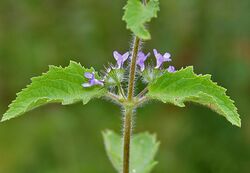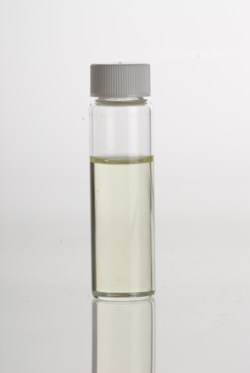Biology:Mesosphaerum suaveolens
| Mesosphaerum suaveolens | |
|---|---|

| |
| Mesosphaerum suaveolens (Vilayti Tulsi) in Hyderabad | |
| Scientific classification | |
| Kingdom: | Plantae |
| Clade: | Tracheophytes |
| Clade: | Angiosperms |
| Clade: | Eudicots |
| Clade: | Asterids |
| Order: | Lamiales |
| Family: | Lamiaceae |
| Genus: | Mesosphaerum |
| Species: | M. suaveolens
|
| Binomial name | |
| Mesosphaerum suaveolens | |
| Synonyms[1] | |
| |
Mesosphaerum suaveolens, synonym Hyptis suaveolens, chia,[2] pignut, or chan, is a branching pseudocereal plant native to tropical regions of Mexico, Central, the West Indies, and South America, as well as being naturalized in tropical parts of Africa, Asia and Australia .[3] It is generally 1–1.5 m (3.3–4.9 ft) tall, occasionally up to 3 m (9.8 ft). Stems are hairy, and square in cross section. Leaves are oppositely arranged, 2–10 cm (0.79–3.94 in) long, with shallowly toothed margins, and emit a strong minty odor if crushed. Flowers are pink or purple, arranged in clusters of 1–5 in the upper leaf axils.[4]
Traditional Uses
Studies have found that M. suaveolens is effective as an insecticide.[5][6]
Mesosphaerum suaveolens can be made into a refreshing drink by soaking the seeds in water and refrigerating the mix. Some people add lemon or other citrus to improve the taste. In Colima, Mexico, people use the M. suaveolens seeds to prepare a traditional beverage called bate. The process consists in roasting and grinding the seeds and then mixing the resulting powder with water. M. suaveolens is also a traditional treatment for diarrhea.[citation needed]
See also
References
- ↑ 1.0 1.1 "Mesosphaerum suaveolens (L.) Kuntze", Plants of the World Online (Royal Botanic Gardens, Kew), https://powo.science.kew.org/taxon/urn:lsid:ipni.org:names:158297-2, retrieved 2019-10-11
- ↑ Wood, John R.I.; Bedolla Garcia, Brenda Yudith; Pink, Lynsey; King, Christabel (June 2022). "1028. SALVIA HISPANICA: Lamiaceae" (in en). Curtis's Botanical Magazine 39 (2): 359–378. doi:10.1111/curt.12443. ISSN 1355-4905. https://onlinelibrary.wiley.com/doi/10.1111/curt.12443.
- ↑ Kew World Checklist of Selected Plant Families
- ↑ "Weeds of Australia Factsheet — Hyptis suaveolens". http://keyserver.lucidcentral.org/weeds/data/03030800-0b07-490a-8d04-0605030c0f01/media/Html/Hyptis_suaveolens.htm.
- ↑ Cyrille Adda, Pierre Atachi, Kerstin Hell, and Manuele Tamò. Potential use of the Bushmint, M. suaveolens, for the Control of Infestation by the Pink Stalk Borer, Sesamia calamistis, on Maize in Southern Benin, West Africa
- ↑ Conti et al. Hyptis suaveolens and Hyptis spicigera (Lamiaceae) essential oils:qualitative analysis, contact toxicity and repellent activity against Sitophilus granarius.
External links
- Making Chan drink (spanish)
- Using Chan as insecticide (spanish)
- Evaluation as Alternative Crop for Food and Drugs (spanish)
- Protein value of Chan (spanish)
- Chan used as diarrhea treatment (spanish)
- [1]
Wikidata ☰ {{{from}}} entry
 |


